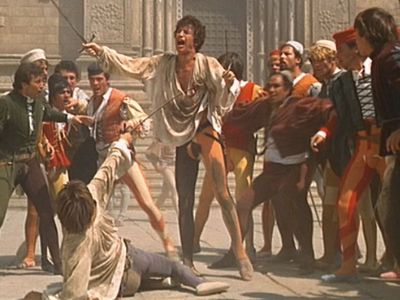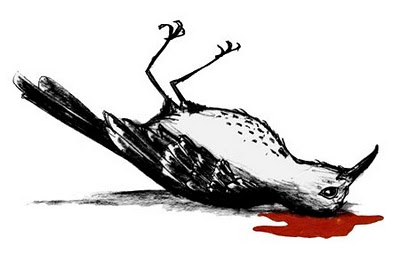In order to keep up with the remaining sections of To Kill A Mockingbird, we will begin online discussions, starting today.
Your responsibilities are to keep up with the strands below this post. I will post three strands over the course of this week. For each discussion question, your job is to respond with ONE original post and at least TWO comments on others' original posts throughout the week. I will start grading the responses next Monday. I will also respond to the posts that you all create.
(One Original Post + Two Responsive Posts) x 3 discussion questions = 100 in the gradebook. If I press you on your responses, feel free to defend yourself, but do so respectfully.
THE GROUND RULES:
1. Try to be thoughtful in your responses.
2. Use text evidence. Paraphrasing is okay.
3. No rude, vulgar, or derogatory commentary.
4. Stick to your own class posts.
5. Encourage discussion. Feel free to ask more questions of your classmates.
 | Individual Paragraphs and Mission Statements | | File Size: | 42 kb | | File Type: | pptm |
Download File
On Friday, we discussed the art of the mission statement, and its three mandatory parts:
1. The Purpose - Your mission statement must include why your organization exists. Who needs/desires your services?
2. The Business - This is the actual work of your organization. This requires resources, especially money and manpower. What services will your organization provide? Think "big picture" - don't get too specific yet. That will come later.
3. The Values - This is why your organization believes these services should be provided. The ideals (religious/spiritual, moral, ethical, financial, etc.) are the reasons that drive the purpose and the work.
I have found some decent examples below to show you what the mission statements can look like. Remember: it should not contain simple sentences or jargon. The sentences should be well-crafted, compound/compound-complex sentences and use plain, but very direct and specific language so any audience can understand your cause.
Read the examples below to see if they pass your test...
The ASPCA Animal Behavior Center is dedicated to promoting balanced, respectful and enriched relations between people and pets through graduate and post-graduate programs for aspiring animal behaviorists; continuing behavioral education for shelter personnel, trainers, veterinarians, and other animal professionals; and the provision of practical, humane advice on pet behavior for owners.
People for the Ethical Treatment of Animals (PETA) is the largest animal rights organization in the world, with more than 3 million members and supporters. PETA focuses its attention on the four areas in which the largest numbers of animals suffer the most intensely for the longest periods of time: on factory farms, in the clothing trade, in laboratories, and in the entertainment industry. We also work on a variety of other issues, including the cruel killing of beavers, birds, and other "pests" as well as cruelty to domesticated animals. PETA works through public education, cruelty investigations, research, animal rescue, legislation, special events, celebrity involvement, and protest campaigns.
The mission of The Mica and Ahmet Ertegun Graduate Scholarship Programme in the Humanities shall be to fund and otherwise encourage graduate study in the humanities by Ertegun Graduate Scholars, a group of highly qualified students from throughout the world who: (i) have a plan to enlarge their knowledge; (ii) have the desire to extend their vision; and (iii) seek the opportunity to exchange their ideas.
APHSA pursues excellence in health and human services by supporting state and local agencies, informing policymakers, and working with our partners to drive innovative, integrated and efficient solutions in policy and practice.
Planned Parenthood believes in the fundamental right of each individual, throughout the world, to manage his or her fertility, regardless of the individual's income, marital status, race, ethnicity, sexual orientation, age, national origin, or residence. We believe that respect and value for diversity in all aspects of our organization are essential to our well-being. We believe that reproductive self-determination must be voluntary and preserve the individual's right to privacy. We further believe that such self-determination will contribute to an enhancement of the quality of life and strong family relationships.
The Walt Disney Company's objective is to be one of the world's leading producers and providers of entertainment and information, using its portfolio of brands to differentiate its content, services and consumer products. The company's primary financial goals are to maximize earnings and cash flow, and to allocate capital profitability toward growth initiatives that will drive long-term shareholder value.
The mission of the National Autism Association is to educate and empower families affected by autism and other neurological disorders, while advocating on behalf of those who cannot fight for their own rights. We will educate society that autism is not a lifelong incurable genetic disorder but one that is biomedically definable and treatable. We will raise public and professional awareness of environmental toxins as causative factors in neurological damage that often results in an autism or related diagnosis. We will encourage those in the autism community to never give up in their search to help their loved ones reach their full potential, funding efforts toward this end through appropriate research for finding a cure for the neurological damage from which so many affected by autism suffer.
The American Cancer Society is the nationwide community-based voluntary health organization dedicated to eliminating cancer as a major health problem by preventing cancer, saving lives, and diminishing suffering from cancer, through research, education, advocacy, and service.
Wikimedia Foundation is dedicated to the development and maintenance of online free, open content encyclopedias, collections of quotations, textbooks and other collections of documents, information, and other informational databases in all the languages of the world that will be distributed free of charge to the public under a free documentation license such as the Free Documentation License written by the Free Software Foundation Inc. The goals of the foundation are to encourage the further growth and development of open content, social software Wiki-based projects and to provide the full contents of those projects to the public free of charge.
Remember, you can meet with me everyday this week, after school, if you need help with your statements or individual paragraphs. Happy writing!
 | DIDLS assignment and notes | | File Size: | 32 kb | | File Type: | doc |
Download File
Had I known it would take so long, I just would have printed the darn thing out...
If you were absent last week because of orchestra, tennis, or other events, print this assignment and go through the steps. We haven't worked through DIDLS since "The Cask of Amontillado", so it's okay if you're rusty. Just consider this a warm-up for what you are doing now - SIFTing through text for tone, theme, and imagery.
For this assignment, everything you do revolves around characterizing Jem. He is just as important as Scout, and gets some attention in this chapter.
**If anyone else is reading this, I hope you read Chapter 6. It's a doozy...and you might have a quiz on the book tomorrow.
 | socratic_seminar_prep_tkam.pptx | | File Size: | 521 kb | | File Type: | pptx |
Download File
Here is the presentation from today's class, as well as the questions, if you need them for your review.
I am very much looking forward to your conversations tomorrow. Come ready to impress your classmates. :-)
On Wednesday and Thursday, meet me in Classroom R-2. I'll be there a-waitin'.
So far this week, you have taken two days of a marathon test. AWESOME.
Seriously, I have total faith that you did so well. I genuinely believe that you all did very well, and probably even beyond. As soon as scores come in May, I'll inform you guys individually and conference with what all of it means for your future (especially your summer).
Now, for all things THIS week...
First things first - those lit term journals. I told you guys that they would be due after the Romeo and Juliet exam...and that date has passed. All classes are due to submit your journals THIS FRIDAY, 5 April. Remember the coding - n0t all terms need both examples and explanations, but you do need examples from Romeo and Juliet. You will be given time for you to complete the lit term journals during your two-hour block in my class. All journals will be due at the END of class on Friday...I might even give you time to work on them during Friday's class.
Some of you are thanking your lucky stars for a screwed-up schedule, but waiting until Friday is NOT a good idea, because there are other things to be done...
Now, for everything else...
 | naylor_-_meanings_of_a_word.pdf | | File Size: | 2005 kb | | File Type: | pdf |
Download File
The file above is an essay, titled "The Meanings of a Word", by Gloria Naylor. Because we are reading To Kill A Mockingbird beginning next week, we need to tease out one of the major motifs in the book - one that is infinitely problematic - and that is the treatment of race, especially in words. Naylor attempts to hash this out from a rather interesting perspective.
One warning before you read this essay - you don't have to agree with its content, but you do have to discuss it in a civilized manner. That discussion, civilized and highly academic, will be graded. I do expect that you will come with questions, but nobody should speak from any perspective but their own. I would like you to have this essay read and annotated for Monday. During class this week, I will go over the procedures for this structured conversation. I look forward to you all having lots to say, but being upstanding ladies and gentlemen all the while.
So, download a copy of the essay and finish your lit term journals. :-) We'll talk, beginning tomorrow.
 | R and J Take Home Exam - Mac Users | | File Size: | 115 kb | | File Type: | pdf |
Download File
 | r_and_j_take_home_exam_-_only_1_number_4.docx | | File Size: | 90 kb | | File Type: | docx |
Download File
Apparently, there are two "Number 4"s on the test... My error, my apologies. The question regarding the servants has been eliminated. To reduce confusion, I have uploaded the edited version of the test.
Here it is.
 | Romeo and Juliet Take Home Exam | | File Size: | 90 kb | | File Type: | docx |
Download File
Here it is, folks. Remember, this is a temp file, so go ahead and download it for your use. You can type or write answers - your choice.
Good luck. :-) Everything you need to be successful
Paris: 'I were if Thursday were tomorrow!'

Yes, when Lord Capulet and Count Paris arranged the marriage to Juliet (whilst Romeo and Juliet were upstairs...confirming another marriage), they decided Wednesday was too soon...so Thursday it is! I wish this were comic relief...
The caption above pretty much sums up what you need to know about 3.4, save why Capulet did it. Why would he force his daughter into a marriage that didn't seem like a great idea at the beginning of the play? To cheer her up. Because everyone enjoys forced marriages... (sic) Clearly Juliet doesn't, but she also doesn't enjoy having to watch her marriage fade into the sunlight. The light/dark dichotomy seems to come back in 3.5, when Juliet declares, "Let day in, and let life out", as Romeo shimmies down the ladder one final time before heading to his exile in Mantua. Light seems to bring forth death, as daylight and heat seem to bring forth both major fights that have occurred in the play so far. Mercutio and Tybalt die in broad daylight, in Verona's town square. Light would expose Romeo's relationship to Juliet, as it exposed his tortured self when Rosaline turned him away for a life of celibacy. Darkness, however, is able to shield Romeo and Juliet from having their forbidden love broadcast all over Verona. Darkness gives Romeo possibilities for love, and allows Juliet to tell her truths, exposing her desire for her husband. Well, since the audience knows how this play is going to end, let's talk about the concept of dramatic irony. We know that dramatic irony exists when the audience understands/knows more about the plot than the characters on stage. Well, Juliet is torn in her emotions surrounding the death of Tybalt, as well as Romeo's fresh exile. When she cries, the audience knows her allegiance is with Romeo, because he is her husband (remember...this is over 400 years ago; a wife's allegiance is to her husband, not to her father). However, Juliet doesn't exactly want to say farewell to the relationship with her parents, either. She tries to buy time, explaining to her mother why she is so sad, and why she won't marry Romeo. There are a couple of lines that actually beg the question, "How could her parents not get it?" First, when Lady Capulet asks Juliet why she is still crying, Juliet eventually replies, "Feeling so the loss, I cannot choose but ever weep for the friend" (III.v.77-78). She feels the loss of Tybalt, but she forever weeps for Romeo until his return. Lady Capulet believes, however, that she weeps for the loss of Tybalt the man, and Tybalt the family member. No wonder Lady Capulet thinks she's silly; her mourning has no control - but remember, Juliet is feeling the most loss out of anyone in the play at this point. She has the right to mourn...but she can't tell anyone why she would be sad over the exile of a Montague. Lady Capulet just assumes she wants Romeo dead, as everyone else the Capulet house does.Second, when Juliet finds out about her impending marriage to Count Paris, she replies in shock, "I pray you tell my lord and father, madam, I will not marry yet; and when I do, I swear it shall be Romeo, whom you know I hate, rather than Paris" (III.v.121-124). When Juliet says, 'whom you know I hate', Juliet is responding in kind to Lady Capulet's pointed remarks regarding Romeo. Lady Capulet is beside herself. If any of us were Lady Capulet, the reaction would be, "Why in the hell would she say that? Why would she dishonor her family in this way?" So, she washes her hands of her and hands her over to Lord Capulet, who, shaking with rage, threatens to disown her if she doesn't show up at St. Peter's on Thursday. At the end of the scene, Juliet asks the Nurse for some advice...what should she d0? The Nurse doesn't give her much comfort (yeah, she says she does...but we learn that in Act 4 that she no longer can trust the Nurse) - the Nurse simply replies that she should marry Paris and forget Romeo. Juliet asks to go to confession to absolve the sin of dishonoring her parents...that puts her in Friar Laurence's cell in 4.1, ready to commit suicide if he doesn't come up with a solution that works...reasonable or not. Now, for the part of the blog post you were searching for...HERE is what you need to know/understand/review/pray about regarding the quiz...Act II:- Locate and review the heavy use of metaphor in Romeo's soliloquy in 2.2 (the 'balcony scene')
- Review the concept of duality in Juliet's 'soliloquy', when she discusses the problem of Romeo's name.
- Review and understand why Juliet keeps asking about why Romeo climbed up the wall and keeps warning him about his possible death, dodging his questions in 2.2
- Understand Friar Laurence's role as a foil in 2.3, especially when he chastises Romeo
- Understand the revolution of Romeo's tragic flaw in 2.3
- Understand what Mercutio has to say regarding Romeo and Tybalt at the beginning of 2.4
- Go over the puns in 2.4.
- Understand the Nurse's change in attitude in 2.4 when speaking to Romeo
- Understand the revolution of Juliet's tragic flaw in 2.5
- Understand the foreshadowing given by Friar Laurence's advice in 2.6, before they marry.
Act III:- Understand why Tybalt approaches Mercutio, and why Mercutio challenges Tybalt at the beginning of 3.1
- Understand Mercutio's 'curse' in 3.1 - why can he curse both families?
- Explain and understand Romeo's reaction to Tybalt's murder immediately after it is committed in 3.1
- Explain why the Prince exiles Romeo as his sentence for killing Tybalt in 3.1
- Understand why Juliet is confused when the Nurse brings her news in 3.2
- Understand and explain why Friar Laurence chastises Romeo in 3.3
- Explain and understand Romeo's moodswings in 3.3
- Refer to the above for Scenes 4 and 5
Short answer questions:What is significant about the Nurse's constant interruptions in Act 2?What is different about the light/dark symbolism in Act 2, Scene 2 versus the light/dark symbolism in Act 3, Scene 5?

Romeo kills Tybalt in Zeffirelli's version of Romeo and Juliet. By killing Tybalt in the heat of impassioned anger, Romeo sets off a chain of events that help Shakespeare to create the perfect tragedy.
Act 3, Scene 1: What Many Of You Missed.
After reading your Twitter scenes (which I enjoyed thoroughly, by the way), I noticed that you gathered many of the important points necessary to understand why the play progresses forward. Here's what you caught:
1. Mercutio knows Romeo won't fight...at least willingly. Romeo is a lover, but Mercutio wishes for Romeo to answer the challenge that has been put before
him by Tybalt. Mercutio knows that Tybalt is a good fighter, but he is beginning to question Romeo's loyalty to family and friends, especially after he ditches them to go shimmy up the Capulets' castle wall.
2. Benvolio...poor guy, he tried so hard to convince everyone to NOT fight. Benvolio knows that the conditions are ripe for the Capulets and Montagues to fight. He even recognizes within himself that he would fight if his family required it. When questioned by the Prince, Benvolio gives a faithful account of events, but does not consider that the Capulets would accuse him of having false loyalties to the Montagues. Benvolio might be the only reason why Romeo is exiled, and not sentenced to death, because of his account of the last brawl.
3. Tybalt didn't get the blood he wanted. Instead, his own blood was spilled. As Friar Laurence said, "Violent delights have violent ends." This doesn't just happen with love. Often, when we see a character in a literary work with a temper such as Tybalt's, he will self-destruct. His anger blinds him from his objective - to recover his honor by killing Romeo - and goes to focus on Mercutio. Did he not consider that Romeo would then be blinded by anger himself? Did he not consider that this would drive Romeo to commit his fatal act? Perhaps he didn't care. Perhaps.
4. Pay attention to this, because this is something you missed: When Romeo kills Tybalt, he immediately regrets killing him. According to your Twitter feeds, this is something you did not catch. Romeo stabs him, realizes what he has done, and screams into the sky, "O, I am fortune's fool!" He thought he was invincible for a hot second, because of his marriage to Juliet combined with his blind anger for Tybalt's murder of Mercutio. But when he realizes how badly he has jeopardized his marriage in that split second, he regrets having killed his newly found kinsman. He has committed the ultimate sin against a family member.
Which brings us to Scenes ii and iii, where he sulks about it and his tears are "womanish." Awesome.
III.ii focuses on Juliet's emotional reaction to Romeo's killing her kinsman. The Nurse doesn't help much, as she further confuses Juliet with her back and forth vague commentary. The only solace that Juliet gains is that Romeo is still alive, but NOT BEFORE Juliet spews a line of paradoxes explaining her divisive emotions regarding her recently wedded groom. It is clear that Juliet loves Romeo by the end of the scene, but Juliet still needs to show devotion to her kinsman. In the end, she gives the Nurse her wedding band to give to Romeo, as a sign of devotion and loyalty to her marriage.
III.iii focuses on Romeo's irrational and impulsive behavior after being exiled from Verona. Romeo probably knows that death is more extreme and permanent than the banishment decree, but Romeo doesn't have any control over his emotions right now. Friar Laurence exposes Romeo's personality (as his foil!) through his exasperation over Romeo's behavior, by calling him "womanish" and declaring that he has "a pack of blessings, light upon thy back". Romeo just wants his wife, plain and simple.
Romeo has a lot of farewells to make at the end of this scene. He still has to go to Juliet, and he will never see Verona in the daylight again.
Let me know if you guys have any que
|




 RSS Feed
RSS Feed